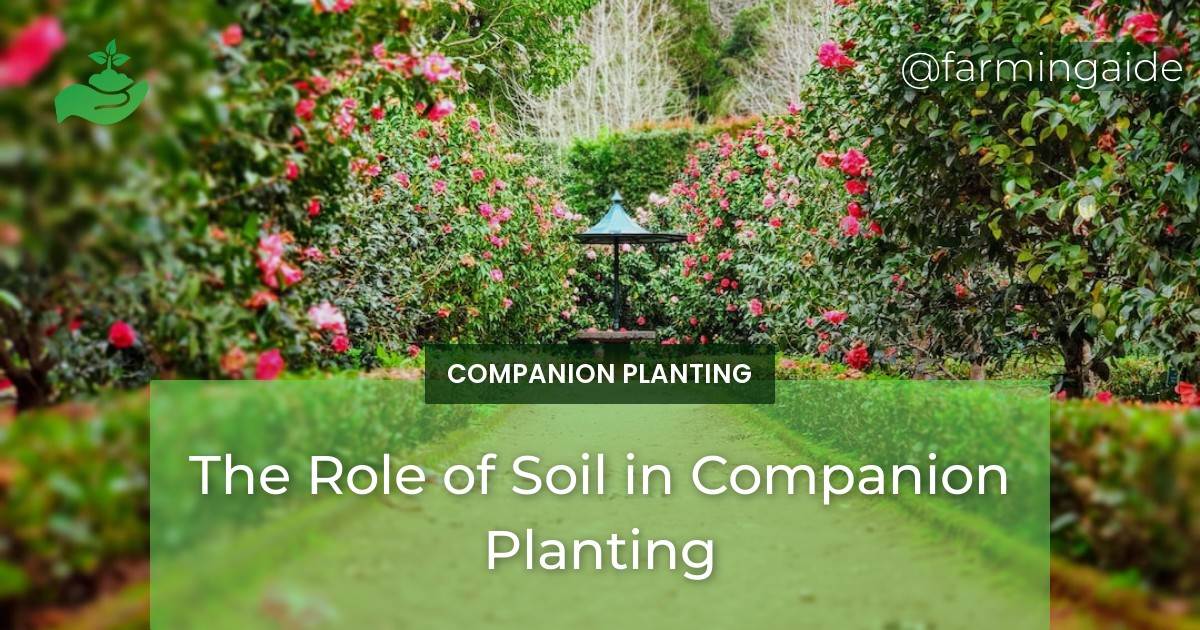Companion planting is a popular gardening technique that involves growing different plants together for mutual benefits. This method has been used for centuries to improve plant health, increase yields, and control pests and diseases. While there are many factors that contribute to the success of companion planting, one of the most crucial is soil quality. In this article, we will explore the role of soil in companion planting and how it can impact the overall success of your garden. By understanding the importance of soil and implementing sustainable practices, you can create a thriving garden full of healthy and productive plants.
Understanding Soil and Its Components in Companion Planting
Soil is a complex and dynamic ecosystem made up of minerals, organic matter, water, and air. Each of these components plays a vital role in the growth and development of plants. Minerals provide essential nutrients for plant growth, organic matter improves soil structure and fertility, water delivers nutrients to the roots, and air allows for proper root respiration. In companion planting, it is crucial to maintain a balance of these components for healthy and thriving plants.Plant Selection and Cultivation Based on Soil Type
Different types of soils, such as sandy, clay, and loam, have varying levels of nutrients and water-holding capacity. This can greatly affect the growth and health of plants. It is essential to choose plants that are well-suited to the type of soil in your garden to ensure successful companion planting. For example, plants that thrive in sandy soil may not do well in clay soil and vice versa. Testing your soil and understanding its type can help you make informed decisions when selecting plants for your garden.Soil Management and Composting for Companion Planting
Soil pH is a crucial factor in companion planting as it can greatly affect the availability of nutrients to plants. Some plants prefer acidic soil, while others thrive in alkaline soil. It is essential to adjust the pH of your soil to match the needs of your companion plants. Compost is also a vital component in companion planting as it provides essential nutrients for plant growth. By creating and using compost, you can improve the overall health and fertility of your soil, leading to successful companion planting.ALSO READ
The Impact of Soil Nutrients on Companion Planting
Plants require a balance of essential nutrients for optimal growth and development. In companion planting, it is essential to understand how different nutrients affect plants and how to address any deficiencies. Regular soil testing can help you identify any nutrient imbalances and make necessary adjustments to promote healthy companion planting.Pest and Disease Control through Soil Quality in Companion Planting
Healthy soil is a natural defense against pests and diseases. Beneficial microorganisms in the soil can help control harmful pests, while certain companion plants can repel pests and attract beneficial insects. Additionally, maintaining a healthy balance of nutrients and microorganisms in the soil through sustainable practices can prevent pest and disease buildup in your garden.ALSO READ
Sustainable Gardening Practices for Soil Health in Companion Planting
Sustainable gardening practices not only benefit the environment but also promote healthy soil in companion planting. Techniques such as crop rotation, cover cropping, and avoiding chemical fertilizers and pesticides can help maintain a healthy balance of nutrients and microorganisms in the soil. By implementing these practices, you can create a thriving garden that supports successful companion planting.Seasonal Planning and Crop Rotation for Soil Health in Companion Planting
Planning and rotating crops is essential for maintaining soil health in companion planting. Crop rotation can improve soil structure and fertility, leading to healthier and more productive plants. It is also important to incorporate cover crops in between growing seasons to further improve soil quality and prevent nutrient depletion.How Does Soil Quality Impact the Success of Companion Planting?
The quality of soil is crucial to the success of companion planting. It directly affects the companion planting benefits by providing essential nutrients and a suitable environment for beneficial interactions between the plants. Poor soil quality can hinder the growth and productivity of companion plants, limiting the potential benefits.
Conclusion
In conclusion, soil plays a crucial role in the success of companion planting. By understanding the components of soil and implementing sustainable practices, you can create a healthy and nutrient-rich environment for your plants to thrive. Matching plants to the right type of soil, managing soil pH, and regularly testing and supplementing nutrients are all essential for successful companion planting. So, get your hands dirty and start creating a thriving garden with the help of healthy soil.RELATED ARTICLES:


